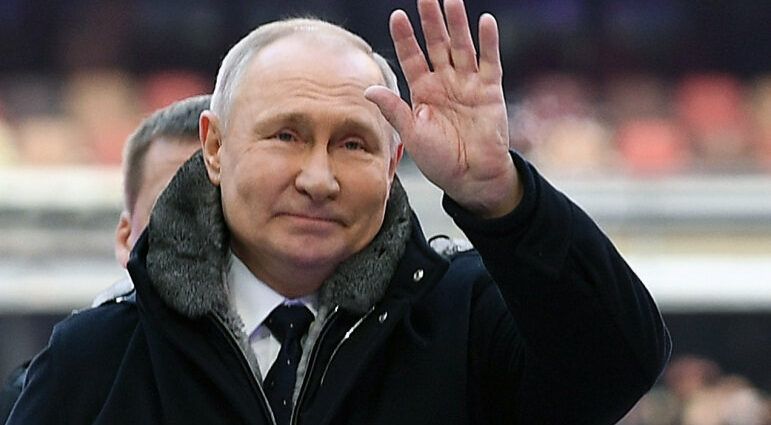Billions of dollars are accumulating in Moscow beyond the reach of its foreign owners.
Stock dividends, interest payments on bonds and anything else that Western investors didn’t sell before the war — it’s all part of the pile of money that’s been trapped by sanctions.
Putin arrives to attend the “Glory to the Defenders of the Fatherland” concert this week.Credit:AP
The accounts are remnants of what’s left of Russia’s ties to the world of international finance, and another marker of its growing isolation. As Russia’s invasion of Ukraine begins a second year and anti-war demonstrations take place this week, questions remain about what will happen to the cash stuck in Moscow.
Legally, the money belongs to some of the biggest investment houses, like JPMorgan Asset Management and Schroders, but privately most acknowledge there’s no hope of recovery. At least, not while Vladimir Putin remains leader.
“You have marked it to zero, you have to forget about it,” said Tim Love at GAM Investment Management, who owned Russian stocks as part of an emerging equity fund. “The market is still there, but when one talks of repatriating dividends or accessing the underlying security, it all comes down to sanctions.”
In conversations, money managers speak about the issue with some frustration, and many don’t want to talk on the record about owning Russian assets while there’s a war going on. Unless they’re willing to test the boundaries of sanctions, they can’t do anything with the cash.
At a press conference this month, Central Bank Governor Elvira Nabiullina declined to disclose how much money is in special non-resident bank accounts, known as Type C, but said it continues to grow.
Interfax reported in November these accounts hold more than 280 billion roubles ($5.4 billion), citing regulatory sources. Bank of Russia representatives declined to comment.
Before the war, foreign investments in Russia were substantial, amounting to around $US150 billion ($220 billion) of stocks and government bonds, data from the Moscow Exchange and Bank of Russia show.
Asset managers have suspended their Russian funds, but some still calculate a theoretical value of how much the assets are worth for clients.
The money legally belongs to some of the biggest investment houses, like JPMorgan Asset Management, but privately most acknowledge there’s no hope of recovery.Credit:AP
For instance, JPMorgan Asset Management’s Emerging EMEA investment trust told clients that the Russian companies it held continued to pay dividends, with approximately £6.3 million ($11.1 million) frozen in C-accounts as of January 4, though it stressed the money was not accessible.
In the case of BlackRock it has terminated the iShares MSCI Russia ETF. The company said that it continues to talk to regulators and others in the market about how to exit the positions.
“The Russian securities will be liquidated at some point in the future, if this is possible, practicable and appropriate,” the company said in a September posting online.
Another asset manager, East Capital, said it had a total of €13 million ($20 million) in the special accounts as of February.
“We have to be cautious about what we can tell our clients,” said Alexandra Morris, investment director at Norwegian asset manager Skagen AS. “We can show them these are the values currently priced, but the likelihood is low that we will be able to access them, in fact they could be confiscated any day.”
Morris said they held 9 per cent of their emerging-market fund in Russian stocks before the invasion, calling it a “major overweight.”
Written off to zero
Some fund managers have hopes, albeit distant, of recovering some of their money. In a December report, East Capital said “we do still believe that there is value in most of our portfolio holdings, because we know they are generating free cash flow and paying dividends.” It added that it has written the assets to zero.
Meanwhile, others are seeking legal help to recover even a fraction of their cash. Grigory Marinichev, a partner at law firm Morgan Lewis & Bockius in New York, said he’s talking to clients looking to explore technical loopholes.
One possibility is a multi-stage transfer of the cash to similar accounts held by investors Russia does not class as “unfriendly.” Another is to convert C-accounts into bundles of securities that could be sold to investors not bound by sanctions, he said.
“All these options will involve substantial writeoffs,” Marinichev said. “But something is better than nothing.”
Bloomberg
The Business Briefing newsletter delivers major stories, exclusive coverage and expert opinion. Sign up to get it every weekday morning.
Most Viewed in Business
From our partners
Source: Read Full Article
-
PepsiCo Q4 Core EPS Beats Market, Lifts Dividend; Sees Growth In FY23
-
South Korea Inflation Below 5%, Lowest In 10 Months
-
Are shares better than property? The answer is harder than you think
-
Cat litter and yoghurt: What a journalist on $63,500 spends in a week
-
Eurozone Record High Core Inflation Confirmed; Labor Costs Rise Faster



